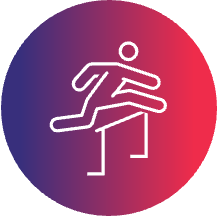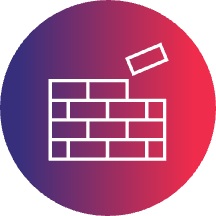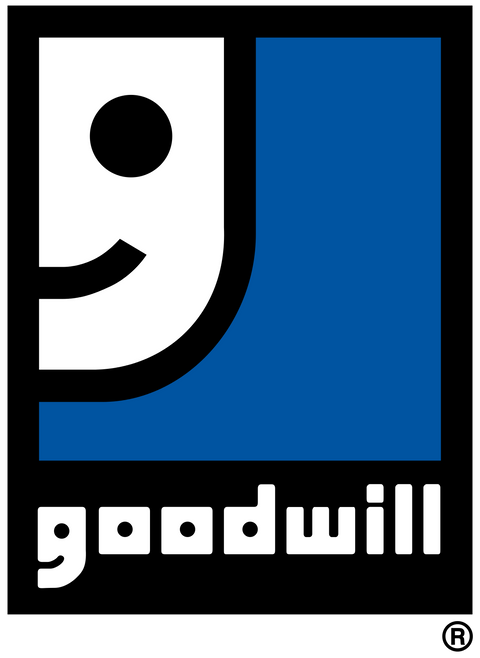

Breaking
Barriers
Promoting Employment Equity Through Transportation
The following project involving Goodwill and African American Leadership Program (AALP) participants is intended solely for informational and educational purposes. The project does not constitute professional advice or create a professional-client relationship. The project is not intended to be a substitute for professional advice. Always seek the advice of a qualified transportation specialist or other qualified professional with any questions you may have regarding transportation solutions for employees. Furthermore, the solutions proposed by the project team may not be suitable for all circumstances or situations. The project team makes no representations or warranties of any kind, express or implied, about the completeness, accuracy, reliability, suitability, or availability with respect to the solutions proposed or the information, products, services, or related graphics contained in the project for any purpose. Any reliance you place on such solutions or information is therefore strictly at your own risk. In no event will the project team be liable for any loss or damage, including without limitation, indirect or consequential loss or damage, or any loss or damage whatsoever arising from loss of data or profits arising out of, or in connection with, the use of this project. Finally, Goodwill and AALP program participants acknowledge that their participation in this project does not create an obligation on the part of the project team to implement any of the proposed solutions. The project team reserves the right to modify or reject any proposed solutions at their discretion.
For many, transportation is a major roadblock to achieving their full potential, limiting access to job opportunities, education, healthcare, and other essential services. Solutions to transportation challenges, can open a world of possibilities and empower individuals to create brighter futures.
PROJECT ROADMAP
The Project Roadmap provides an overview of the key phases and milestones of the transportation project. It outlines the timeline and key activities undertaken by the team and provides an overview of the recommendations and solutions developed for Goodwill.
Research and Planning
The team conducted research to identify the transportation challenges faced by Goodwill employees and developed a plan for how we can contribute to addressing those challenges. This involved gathering data through surveys, a focus group, and interviews, as well as analyzing existing transportation services in the area.
Brainstorming and Concept Development
The team engaged in brainstorming sessions to generate ideas for innovative transportation solutions that meet the needs of Goodwill employees. The team considered various factors, such as cost, feasibility, and sustainability, when developing concepts.
Solution Development and Refinement
The team engaged in idea generation sessions creating and developing a range of possible transportation solutions that meet the needs of Goodwill. The team considered various factors, such as cost, feasibility, and sustainability, when developing concepts. The team collaborated with stakeholders, such as transportation providers, team lead, and community leaders, to refine and optimize the solutions.
Solution Recommendation and Planning
The team recommends transportation solutions to Goodwill based on their research and idea development work. The team provides Goodwill with information on how to implement the recommended solutions and offers support in the planning process as needed.
Dissemination and Sharing
The team shares the results and outcomes of the project with the stakeholders. The team created this report, presentations, or other materials to communicate project findings and best practices to inspire and guide Goodwill’s transportation project.


PROJECT CHALLENGE
Millions of hardworking individuals in our communities' struggle to make ends meet due to the lack of reliable transportation. According to a report by the American Public Transportation Association, nearly 87% of people who take public transportation in the United States do so to get to work. Unfortunately, many low-income individuals, who already face significant economic challenges, are left stranded due to unreliable transportation options. This leads to missed job opportunities, lost income, and a reduced quality of life for them and their families.
The issue of unreliable transportation also disproportionately affects minority communities. A report by the National Conference of State Legislatures found that African Americans and Latinos are more likely to rely on public transportation as their primary mode of transportation. These communities often face longer commute times, and they are more likely to experience delays and service interruptions, leading to missed job opportunities and reduced economic mobility.

Face obstacles
Employees struggle with commuting to work due to unreliable transportation options, such as long wait times, limited routes, and high expenses. This lack of reliability results in more absences, late arrivals, and decreased productivity.

Overcome barriers
Transportation barriers demand stable and reliable options for employees to overcome. By eliminating dependence on unreliable and informal networks, employees can cultivate self-resilience.

Build solutions
Support employees with tools and coaching that support their personal development plans, fostering knowledge, wealth, and self-reliance. Offer engaging training sessions and workshops.
Goodwill aims to identify transportation access gaps within its 7-county territory (Cook, DuPage, Kane, Lake County, Milwaukee, Racine, Waukesha) and develop solutions that provide access to reliable transportation for all, regardless of where they live, their income level, or their race. These efforts will aid in planning for new growth areas in a strategic manner, removing transportation barriers, and ultimately improving the recruitment, retention, and advancement of Black and Brown talent.
ABOUT US
We are a group of aspiring community leaders from Milwaukee's African American Leadership Program (AALP), brought together by our shared passion for creating positive change in our community
As part of our program, we are working on a transportation project in collaboration with Goodwill, aimed at finding innovative solutions to improve transportation access for employees. Our team members come from diverse backgrounds and bring a range of skills and experiences to the project. We share a commitment to equity, inclusion, and
social justice and are united by a common goal of making a difference in the lives of others. Through this project, we have gained valuable experience in teamwork, problem-solving, and community-building, and have learned firsthand the importance of collaboration and partnership in achieving our goals.
Collaborating has been a transformative experience, one that has not only improved our problem-solving skills but has also enriched our understanding of the challenges faced by those in need of transportation.

Suzanne Maldonado
VP of Talent Bridge & WCC
TEAM LEAD
Goodwill SE Wisconsin
With extensive experience in leadership roles, she provides strategic direction to a team of professionals who assist people in connecting to meaningful work and has a strong background in strategic planning and operational leadership.
Jackie Q. Carter
Port Director
City of Milwaukee
As Port Director for the City of Milwaukee, Jackie oversees all business operations. Jackie holds a Bachelor's degree in Business & Management and Professional Communication from Alverno College and an MBA from Concordia University.
Yaa Engel
DIRECTOR OF ECONOMIC DEVELOPMENT
Harbor District
Yaa is dedicated to driving change in Milwaukee's harbor, working to revitalize the area and address access disparities, fostering pride and inclusivity. Her background in venture, corporate partnerships, and education helps Yaa create an environment for all to thrive.
Kenya Simms
Strategic Sourcing Manager
ManpowerGroup
Kenya Simms is a Strategic Sourcing Manager at ManpowerGroup. She holds a Bachelor's degree in Business & Management from Alverno College and an MBA from Cardinal Stritch University.
Latoya Stamper
Lead Social Worker
Children's Wisconsin
Latoya Stamper is a Licensed Medical Social Worker at Children's Wisconsin. She has a Bachelor's Degree in Psychology and Professional Comm. from Alverno College and a Master's In Direct Social Work Practice from UW- Milwaukee.
Brandon Wigley
Program Officer
Bader Philanthropies
Brandon is the Program Officer for both the Employment and Community Matters grantmaking portfolios at Bader Philanthropies. He holds a BA in Liberal Arts, Masters in Divinity and law degree from Marquette Law School.
Bregetta Wilson
Lived Experience Strategic Advisor
WI Dept of Children & Families
Bregetta Wilson, is the Lived Experience Coordinator for the Department of Children and Families. She has is an advocate, community leader, and change agent that supports family advocacy, mental health, and social justice efforts.
Coman Young
Global Remote Support Manager
Rockwell Automation
Coman Young is the Global Remote Support Manager at Rockwell Automation, where he has worked for 23 years and oversees a large team of engineers and supervisors and is responsible for developing strategies to meet company objectives.
PROJECT FINDINGS
This study highlights the impact of transportation on Goodwill employees and their ability to succeed. Transportation-related barriers perpetuate inequality and hinder socioeconomic progress. The Brookings Institution found that lack of reliable transportation limits job prospects and contributes to the cycle of poverty (Brookings Institution, 2019).
The working poor spend a smaller portion of their income on commuting expenses compared to other workers. However, due to their limited income, these costs constitute a larger proportion of their earnings, placing a greater burden on them.
Among the working poor, those who drive their own vehicles face even more financial strain. They spend a higher percentage of their income on commuting compared to those who rely on public transit. This indicates that private vehicle ownership costs, including fuel, maintenance, and insurance, significantly impact the limited financial resources of low-income workers.
Low-income workers often choose more affordable transportation options like public transit, carpooling, biking, and walking. This demonstrates their resourcefulness but also highlights the limited availability of reliable public transit infrastructure and potential challenges with access and connectivity.
These findings emphasize the importance of considering multimodal access when locating companies in areas with diverse and accessible workforce pools, particularly when employing low- to moderate-wage workers. By providing multimodal transportation options, companies can alleviate financial burdens and potentially reduce turnover rates. Offering transportation support can be a cost-effective measure for companies, as the expenses associated with turnover and rehiring often outweigh the investment required for transportation assistance.
Chicago has largest number of workers leave a job due to bad commute
Nearly 1 in 5 quit in their first week
23% of workers quit a job because of bad commute
The avg US worker spends 19% of income on transportation
The poorest US worker spends 40% of the income on transportation
Transportation is a bridge that connects opportunity to success.
49 of the 50 largest U.S. metro areas have transportation disparities
Project Solutions
START THE JOURNEY
By taking immediate and decisive action, Goodwill showcases its unwavering dedication to supporting the transportation needs of its employees, thereby fostering an environment of equity, inclusivity, and empowerment. In bridging the gap, they make commuting more affordable and ensure reliable and convenient transportation options for their valued workforce. Furthermore, this initiative encourages greater understanding and collaboration among employees, fortifying teamwork and camaraderie.
Understand the entire challenge
- Conduct an extensive survey to better understand individual employees' transportation hurdles, allowing Goodwill to develop a targeted and effective solution.
- Collaborate with local community organizations specializing in transportation services for underserved populations to explore existing resources, programs, funding opportunities, and partnerships.
Partner with key stakeholders
- Align with local transportation providers (bus companies, ride-sharing services) to negotiate discounted rates or special arrangements for Goodwill employees.
- Connect with other employers in the area facing similar transportation challenges to leverage collective resources and find better solutions for everyone.
Create programming
- Implement a carpooling initiative through an internal platform or partnership with existing carpooling services, reducing transportation costs, alleviating parking congestion, and improving accessibility.
- Provide shuttle services strategically in areas with high employee concentration or limited public transportation options.
- Facilitate flexible work arrangements, such as allowing employees to choose shifts based on their transportation availability, forming carpool groups, or exploring remote work and compressed workweeks.
- Implement reimbursement programs to cover public transportation fares, fuel costs, etc., easing the financial burden of transportation for employees.
Focus on the Endgame
Goodwill fosters a lasting impact, empowering employees to improve their situations and achieve stability. It surpasses mere charity, as Goodwill strives to offer every opportunity for employees to thrive and create a better future.
Introducing transportation as part of Goodwill's comprehensive employee resource package not only promotes success but also demonstrates a commitment to supporting employees in their professional journeys. By incorporating an app and web-based solution into the application and onboarding process, Goodwill can ensure immediate access to transportation resources.
The app will serve as a valuable tool, offering real-time information on various transportation options. Employees can easily access public transportation schedules, ride-sharing services, and carpooling opportunities, tailoring their choices based on their specific needs, location, and schedule. This personalized approach empowers employees to make informed decisions about their daily commutes.
To further address transportation disparities, Goodwill can explore the possibility of establishing an in-house transportation solution. Leveraging the workforce development division, Goodwill employees can serve as a shuttle service for their colleagues, fostering a stronger sense of community and reliability within the organization. This approach not only benefits employees but also creates a potential revenue stream for Goodwill.
Additionally, the app should go beyond transportation support and connect employees to a range of additional resources. By offering access to job skills development programs, financial planning assistance, and community resources, Goodwill equips employees with the tools they need to improve their situations and thrive. This comprehensive approach emphasizes empowerment and self-sufficiency, ensuring a more sustainable and equitable system for all employees.
When it comes to implementation, Goodwill has several options to consider. They can either develop an in-house solution or explore white-labeled options like MobiliSE's Flexride or Jungoo. These pre-built solutions, offered as Software-as-a-Service (SaaS), provide efficient and effective transportation services, leveraging existing technology and expertise. This approach allows Goodwill to focus on delivering a seamless user experience while minimizing development costs.
By making transportation a fundamental part of the employee resource package, Goodwill demonstrates its commitment to supporting employees' immediate needs and long-term success. This holistic approach fosters a thriving work environment, where employees have the necessary resources at their fingertips, empowering them to achieve their goals and contribute to the organization's mission.

Next Steps
Assess current situation
Conduct a comprehensive assessment to understand the challenges faced by employees

Engage stakeholders
Engage employees, management, transportation authorities, community organizations, and others to ensure solutions address all needs.

Develop partnerships
Partner with local transportation providers, employers, and community organizations to establish a network of support.

Use targeted programs
Create transportation and upskilling programs to address the challenges faced by different employees.

Develop partnerships
Partner with local transportation providers, employers, and community organizations to establish a network of support.

Advocate policy changes
Work with local authorities and policymakers to change local policies that resulting in systematic change.

Evaluate and Iterate
Continuously evaluate programming and initiatives and keep looking to make them better.
Thank you, Goodwill team! Your input was valuable and your dedication to addressing employee needs is admirable.
Patricia Evans
Program Specialist
Brenda Sanders
Director of WCC
Deidre Garret
Director of DEI

Chris Talton
VP of Operations
Suzanne Maldonado
VP of Talent Bridge & WCC
Tanya Tatera
Lead Learning Solutions Partner
REFERENCES
- 2019 Annual Report - Brookings. Accessed June 1, 2023. https://www.brookings.edu/wp-content/uploads/2019/11/2019-annual-report.pdf.
- Audrey Wennink. “Companies That Want a Diverse Workforce Should Pay Attention to Public Transit.” Greenbiz. Accessed June 1, 2023. https://www.greenbiz.com/article/companies-want-diverse-workforce-should-pay-attention-public-transit.
- Alireza Ermagun, D. Dai, A. El-Geneidy, Y. Fan, et al. “Equity of Transit Accessibility across Chicago.” Transportation Research Part D: Transport and Environment, July 13, 2020. https://www.sciencedirect.com/science/article/abs/pii/S1361920920306489.
- Luyu Liu, R.A. Cooper, A. Ermagun, M. Gendreau, et al. “Disparities in Public Transit Accessibility and Usage by People with Mobility Disabilities: An Evaluation Using High-Resolution Transit Data.” Journal of Transport Geography, April 21, 2023. https://www.sciencedirect.com/science/article/abs/pii/S0966692323000613.
- Bullard, Robert Doyle, Glenn Steve Johnson, and Angel O. Torres. Highway robbery: Transportation racism and new routes to equity. Cambridge, MA: South End, 2004.
Contact us to learn more
Mailing Address
30 N Racine Ave #230, Chicago, IL 60607
Email Address
smaldonado@goodwillsew.com
Phone Number
262 818 4084


Breaking Barriers
Promoting Employment Equity Through Transportation